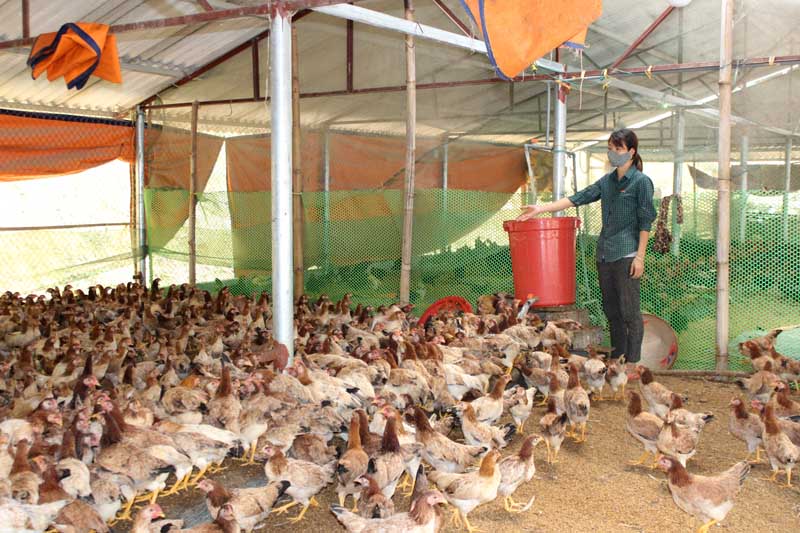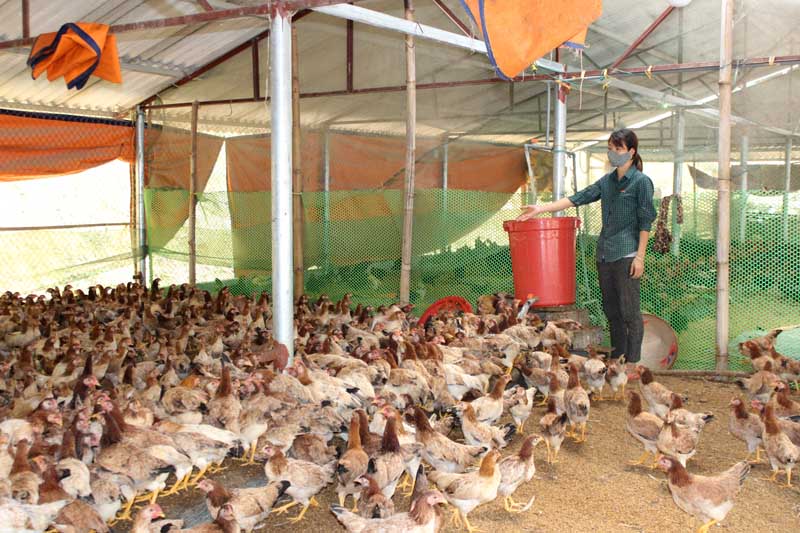
(HBO) - In the past 3 - 4 years, locals in Yen Bong commune of Lac Thuy district have expanded the scale of facilities for developing the chicken raising. Statistics show that the commune counts more than 40,000 chickens, mainly indigenous and Lac Thuy chicken breed. The model helps them improve their income, contributing to promoting the locality’s socio-economic development.

The family of Mrs. Hoang Thi Thuong in Quyet Tien
hamlet is breeding about 5,000 Lac Thuy chickens.
Local households can access many kinds of high-quality
animal feeds. The commune currently has over 10 households engaging in chicken raising
with a total of over 1,000 per year, mainly in Quyet Tien and Soc Bai hamlets. According to a preliminary survey, large-scale
breeding households have earned an annual profit of 100 - 200 million VND.
We visited Mrs. Hoang Thi Thuong's family in Quyet
Tien hamlet, one of the typical households in developing the chicken raising
model of Yen Bong. Currently, Thuong's family is keeping about 5,000 Lac Thuy chickens.
Grasping the market demand, Thuong raised more 1,000 Dong Tao chickens.
Thuong said her family chose Lac Thuy chicken for raising,
because this is easy to raise, grows fast and strongly resistant to diseases,
especially in the cold season. Traders prefer this because of its good quality and
price.
Mrs. Bui Thi Phai, a staff from the agricultural and
forestry expansion agency of Yen Bong commune said in recent years, local households
have bought many chicken varieties in Bac Giang for raising. This is considered a quality breed because the
raising time is short, only 90 to 110 days.Each chicken to the age suitable
of sale will weigh 3-3.5 kg and give a profit equal to that gained from raising
Lac Thuy chicken./.
According to data from the Hoa Binh Provincial Party Committee, the industrial production index for the first six months of 2025 is estimated to have increased by 20% compared to the same period last year. This marks the highest year-on-year growth rate for this period since 2020.
In the first six months of 2025, Hoa Binh province’s export turnover was estimated at 1.145 billion USD, marking an 18.11% increase compared to the same period in 2024. Import turnover was estimated at $ 804 million, a 17.15% increase, which helped the province maintain a positive trade balance.
The lives of the ethnic minority farmers in Tan Lac district have gradually improved thanks to the new directions in agricultural production. This is a testament to the collective strength fostered through the professional associations and groups implemented by various levels of the district’s Farmers’ Union.
With the motto the "product quality comes first,” after nearly one year of establishment and operation, Muong village’s Clean Food Agricultural and Commercial Cooperative, located in Cau Hamlet, Hung Son Commune (Kim Boi district), has launched reputable, high-quality agricultural products to the market that are well-received by consumers. The products such as Muong village’s pork sausage, salt-cured chicken, and salt-cured pork hocks have gradually carved out a place in the market and they are on the path to obtaining the OCOP certification.
In the past, the phrase "bumper harvest, rock-bottom prices" was a familiar refrain for Vietnamese farmers engaged in fragmented, small-scale agriculture. But today, a new spirit is emerging across rural areas of Hoa Binh province - one of collaboration, organisation, and collective economic models that provide a stable foundation for production.
Maintaining growing area codes and packing facility codes in accordance with regulations is a mandatory requirement for agricultural products to be eligible for export. Recently, the Department of Agriculture and Environment of Hoa Binh province has intensified technical supervision of designated farming areas and packing facilities to safeguard the "green passport" that enables its products to access international markets.



